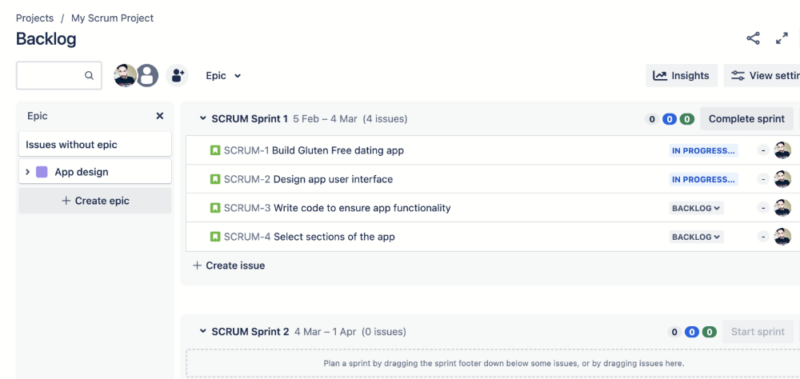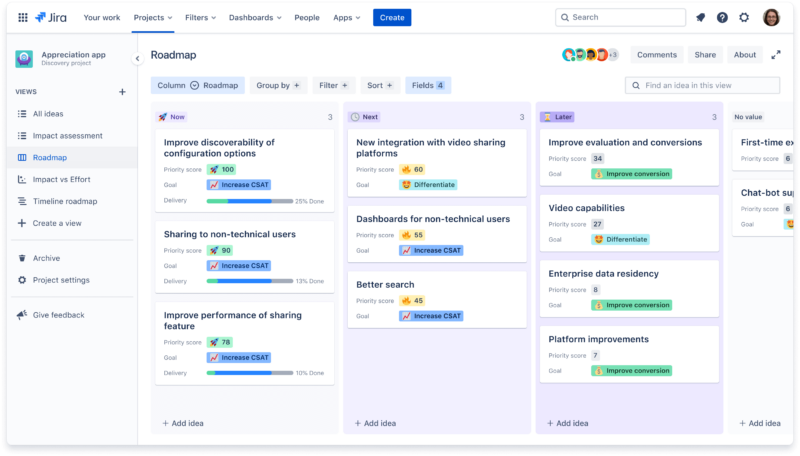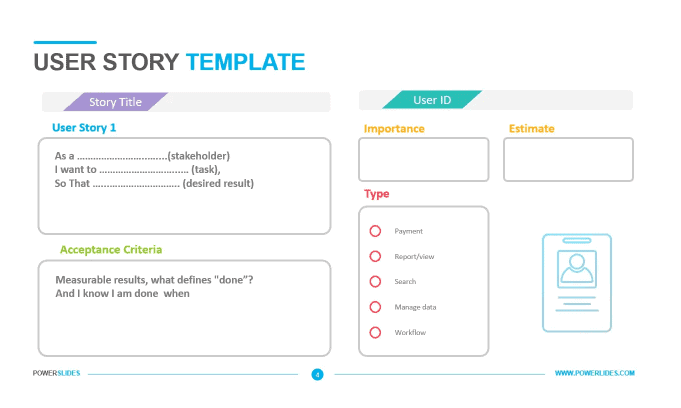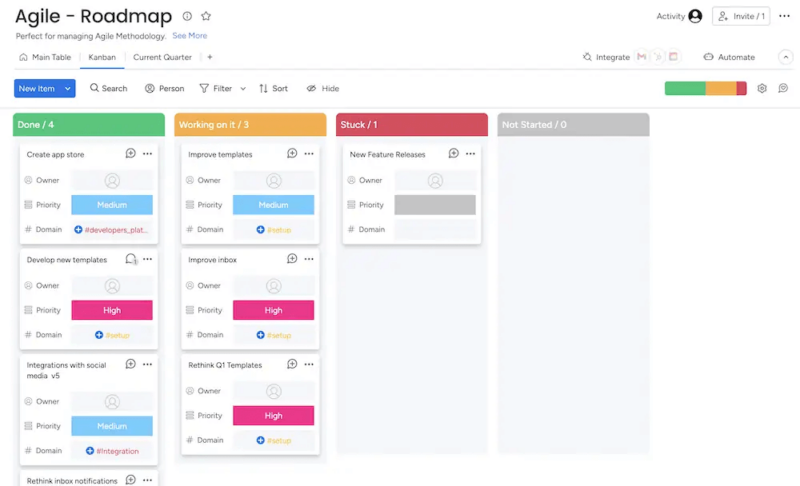Product owners play a pivotal role in the development of software products. Their job is to understand what the end user needs and to ensure the development team makes it happen. This role requires many skills, including knowing how to use the best project management software to monitor project progress. Below, we’ll share 10 important product owner skills.
Whether you’re preparing for a product owner interview or are new to the field, this guide will bring you up to speed on all the technical skills you need. We’ll cover the key product owner skills to have, what you should include on your resume, information about product owner skills assessments and more.
What Skills Do You Need to Be a Product Owner?
Essential product owner skills include a mixture of hard and soft skills. The former entails having strong technical knowledge of the tasks a product owner has to complete each day. This means understanding agile terminology and what your role is within a scrum team. The latter pertains to a person’s personality and the qualities they have that help them do their job effectively.
10 Skills of a Product Owner
Below, we’ll break down the skills across two separate categories, explaining why each skill is important.
Product Owner Hard Skills
1. Ability to Build a Product Backlog
The product owner is responsible for building a product backlog for development teams. This means being able to create a set of tasks (user stories) and features that are required to build a product. The product owner needs to be able to determine which tasks are the most important and know which tasks should take priority over others.

Product owners should also be able to identify certain task dependencies and determine the complexity of each task by using agile estimation techniques. A clear product backlog makes sprint planning much easier and can lead to enhanced productivity.
2. Ability to Build a Product Roadmap and Vision
After the product owner gathers information from the end user, they must then be able to build a product vision. This involves building a roadmap for what the product will look like and the path they’ll take to reach the end goal. The clearer the product vision, the easier it will be for the development team to achieve the overall goal.

A certain level of flexibility is required here, as the roadmap can change paths. Quick thinkers will have a competitive edge, as they will be more agile throughout the process.
3. Understanding User Stories
The product owner needs to accurately break down product features and create user stories. This means explaining who the user is, what product they want and why they want it. Being able to craft clear user stories is essential, as it helps the product development team create a smooth workflow and reduces the risk of bottlenecks.

The product owner must be comfortable gathering user feedback throughout the process, as it helps refine user stories. Stick to the formula of answering the who, what and why. Product owners must also be comfortable helping developers establish the definition of ready (DoR), the definition of done (DoD) and the acceptance criteria.
4. Research and Analytical Skills
Understanding a product isn’t solely about what external stakeholders tell you. A good product owner knows which questions to ask to understand the product. They are also able to analyze potential issues that may prevent the team from meeting client needs. The soft skills below will demonstrate how best to manage this.
5. Knowledge of Project Management Software
Today, many product owners complete their work online. This means using the best agile software to carry out the technical aspects of the role. Having a strong understanding of how this software works and being able to put it into practice will better position you to advance your career.

If you’re on the hunt for good project management software, we recommend reading our monday.com review. monday.com has all the tools a product owner needs, plus plenty of useful templates to help you get started.
Product Owner Soft Skills
6. Communication Skills
The product owner is the messenger for the end user, so they need to be able to communicate effectively with the development team. The product owner is responsible for ensuring there’s no confusion about what needs to be done, and they need to be able to effectively communicate the end user’s expectations.
Successful product owners also need to be able to effectively communicate issues to the end user. This means having the confidence to have potentially difficult conversations and the ability to communicate clearly under pressure.
7. Collaboration Skills
Product owners work closely with several departments, as well as internal and external stakeholders, scrum developers and the scrum master. They need to be able to play nice with others and ensure they’re doing their part to help others produce work to the best of their abilities.
Similar to communication skills, the ability to collaborate well means being able to effectively provide feedback. Product owners also need to be receptive to feedback, have strong emotional intelligence and avoid taking anything personally in order to move forward with the project requirements.
8. Leadership Skills
Leadership skills entail more than just telling others what to do. They also entail maintaining a state of calm in what’s often a high-pressure environment. Product owners need to be approachable and instill a sense of confidence so the team trusts them to steer everything in the right direction.
9. Problem-Solving Skills
Several issues will arise throughout the development process. Features may not work, bugs can appear and the original product roadmap could go off track. A good product owner reacts to problems calmly and rearranges objectives to keep the project moving forward.
Knowing how to reprioritize tasks and workloads is vital when solving problems. In metaphorical terms, the product owner needs to ensure a smooth-sailing ship even when waves of difficulty arise.
10. Managing Client Expectations
Often, what a client wants and what is realistic don’t always align perfectly. Some product owners can be guilty of over-promising because they want to retain the client. This almost always leads to under-delivering, causing bigger complications down the line.
A confident product owner can manage client expectations early and lean on their communication skills to let the client know what is achievable when building a new product or fixing issues in a pre-existing product.
List of Product Owner Skills for Your Resume
To help get your foot in the door, it’s important to highlight product owner skills on your resume. You don’t need to go into as much detail as we did here; a bullet-point format is a great way for potential employers to quickly see what you can do. It should look something like this:
- Knowledge of agile processes that help put the clients’ needs first
- Experience with building a product backlog for dev teams
- A rich understanding of product development terminology, i.e., epics, bugs, issues
- Experience using a range of agile and product management software
- Coding experience
- Strong communication skills
- Collaboration skills
- Adept at conflict resolution
- Analytical skills
- Problem-solving skills
Product Owner Skills Assessment
Product owner skills assessments test how strong your knowledge is (or that of others). Daisy Pilbrow and Javier Ubillos built the original framework for this popular assessment, and it can function as a means of analyzing and improving your skill set. It looks at your ability to work with the team, the client, the product and the processes.
Key points to look at when analyzing your skill set include how well you can communicate a product vision, the strategies you can implement to build the product and how well you adapt throughout the development process. You create a product owner skills matrix and score your knowledge on a scale of one to five to get an overall score and identify areas for improvement.
4 Ways to Improve Product Owner Skills
Below are some ways you can improve your product owner skills.
- Gain more experience: Learning on the job is one of the best ways to improve your skill set. The more projects you work on, the more experience you gain in product ownership. Use your analytical thinking skills to determine areas where you can improve.
- Ask for feedback: It’s a good idea to gather feedback from internal and external stakeholders on how they feel you approach product ownership. You don’t have to take all of their feedback to heart, but it’s a good way to identify areas where you can improve.
- Take a course: There are several product owner courses, like the CSPO certification, as well as how-to guides that explain agile processes, the scrum framework and product owner skills. Study as much as you can to improve your knowledge of the field.
- Study the roles of team members: You don’t need to be a software developer or scrum master to be a good product owner. However, having more than a surface-level understanding of these roles and how to execute them will certainly help you in your role as a product owner.
Final Thoughts
Now that you understand the essential skills a product owner needs, it’s time for you to develop them further. There are plenty of courses available online, as well as governing bodies that offer accreditation. You can also bookmark this guide as a quick reference if you need to brush up on your product owner knowledge.
People often ask what the difference is between a project manager and a product owner when it comes to project management. We created a detailed guide answering this question, so be sure to check it out.
Did you find this article helpful? Which skills do you feel a product owner should have? Is there another role in software development you would like us to break down? Let us know in the comments. Thanks for reading.
FAQ: Skills of a Product Owner
-
There are several skills required to be a successful product owner. Deep technical knowledge of agile processes is essential, as are good communication skills and project management skills.
-
A product owner is the main point of contact for stakeholders, and they need to have a deep understanding of the product that needs building. The product owner is also responsible for creating a product backlog, which gives software developers the details they need to successfully build the product.
-
The qualities, or soft skills, any product owner should have include good communication skills, remaining calm under pressure, being approachable and leading by example.
-
Knowing the technical aspects of agile is a core skill all product owners need. Understanding terminology such as product backlogs, epics and sprints will highlight a person’s technical expertise in this field.
{“@context”:”https:\/\/schema.org”,”@type”:”FAQPage”,”mainEntity”:[{“@type”:”Question”,”name”:”What Skills Are Required for a Product Owner?”,”acceptedAnswer”:{“@type”:”Answer”,”text”:”
There are several skills required to be a successful product owner. Deep technical knowledge of agile processes is essential, as are good communication skills and project management skills.\n”}},{“@type”:”Question”,”name”:”What Are the 3 Main Responsibilities of Product Owners?”,”acceptedAnswer”:{“@type”:”Answer”,”text”:”
A product owner is the main point of contact for stakeholders, and they need to have a deep understanding of the product that needs building. The product owner is also responsible for creating a product backlog, which gives software developers the details they need to successfully build the product.\n”}},{“@type”:”Question”,”name”:”What Are the Qualities of a Product Owner?”,”acceptedAnswer”:{“@type”:”Answer”,”text”:”
The qualities, or soft skills, any product owner should have include good communication skills, remaining calm under pressure, being approachable and leading by example.\n”}},{“@type”:”Question”,”name”:”What Are the Skills of a Product Owner in Agile?”,”acceptedAnswer”:{“@type”:”Answer”,”text”:”
Knowing the technical aspects of agile is a core skill all product owners need. Understanding terminology such as product backlogs, epics and sprints will highlight a person’s technical expertise in this field.\n”}}]}
The post Product Owner Skills in 2024: Key Competencies to Add to Your Resume appeared first on Cloudwards.

